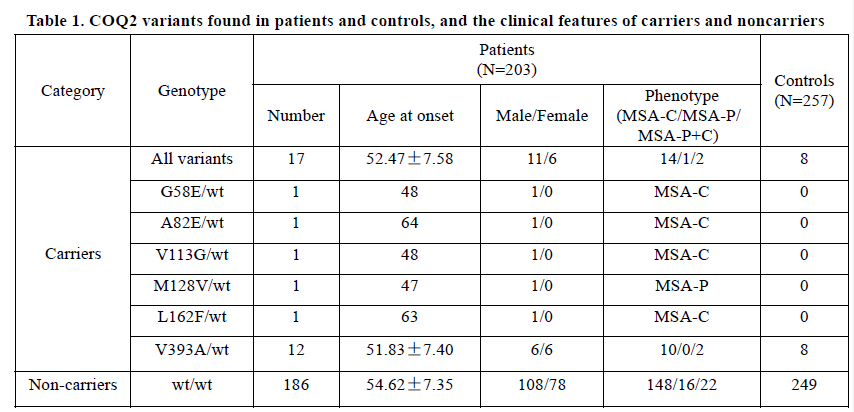Session Information
Date: Monday, June 5, 2017
Session Title: Parkinsonism, MSA, PSP (Secondary and Parkinsonism-Plus)
Session Time: 1:45pm-3:15pm
Location: Exhibit Hall C
Objective: To investigate the involvement of COQ2 variants in Chinese sporadic cases with multiple-system atrophy.
Background: Multiple-system atrophy (MSA) is a rapidly progressive neurodegenerative disease with unknown etiology. Two clinical subtypes, MSA-C and MSA-P, are characterized predominantly by cerebellar ataxia and by parkinsonism, respectively. The relative proportions of the subtypes have been reported to be different among ethnic backgrounds. Variants in the COQ2 have been reported to increase the risk of MSA in the familial and sporadic Japanese patients.
Methods: This study included 203 sporadic MSA patients and 257 unrelated Chinese healthy controls. All the patients were diagnosed as probable MSA based on the second consensus criteria, including 162 MSA-C, 17 MSA-P, and 24 MSA-P+C. The entire coding region of COQ2 were sequenced in all the patients and controls. Student’s t-test was used to evaluate the significance of differences in the mean age at onset between carriers and noncarriers of the COQ2 variants. Fisher’s exact test was used to calculate the significance of the difference in carrier frequencies of COQ2 variants between patients with MSA and controls.
Results: Five singleton non-synonymous variants(p.G58E, p.A82E, p.V113G, p.M128V, and p.L162F)were found in 5 patients. Twelve MSA patients and 8 controls had the heterozygous variant (V393A/wt). The results are presented in [Table 1], including COQ2 variants found and the demographic and clinical characteristics of the patients. Totally 17 MSA patients (8.37%) and 8 controls (3.11%) had the heterozygous variant of COQ2 (odds ratio for patients, 2.84; 95% confidence interval, 1.13 to 7.77; P=0.02). The mean age at the onset of carriers has no significant difference with that of noncarriers (P=0.25).
Conclusions: We observed a statistically significant difference in the carrier frequencies of COQ2 variants between the MSA patients and healthy controls. We replicated the results from the Japanese case series, suggesting that the similar genetic background of the two populations including the predominance of MSA-C in both series, underlie the association of COQ2 variants with MSA. COQ2 gene might be a causative gene or a susceptibility factor in a small subset of MSA patients. Further investigation into the pathogenesis of MSA is needed, with confounding factors taken into account including more stratified population structures and a broader phenotypic spectrum.
References: 1. Multiple-System Atrophy Research Collaboration.Mutations in COQ2 in familial and sporadic multiple-system atrophy. N Engl J Med. 2013 Jul 18;369(3):233-44.
2. Chen YP, Zhao B, Cao B, et al. Mutation scanning of the COQ2 gene in ethnic Chinese patients with multiple-system atrophy. Neurobiol Aging. 2015 Feb;36(2):1222.e7-11.
To cite this abstract in AMA style:
J. Zhang, Y. Hao, Y. Chen, M. Ding, X. Zhang, W. Gu. Mutational analysis of COQ2 in Chinese patients with multiple-system atrophy [abstract]. Mov Disord. 2017; 32 (suppl 2). https://www.mdsabstracts.org/abstract/mutational-analysis-of-coq2-in-chinese-patients-with-multiple-system-atrophy/. Accessed April 20, 2025.« Back to 2017 International Congress
MDS Abstracts - https://www.mdsabstracts.org/abstract/mutational-analysis-of-coq2-in-chinese-patients-with-multiple-system-atrophy/

